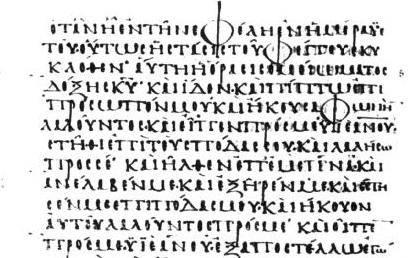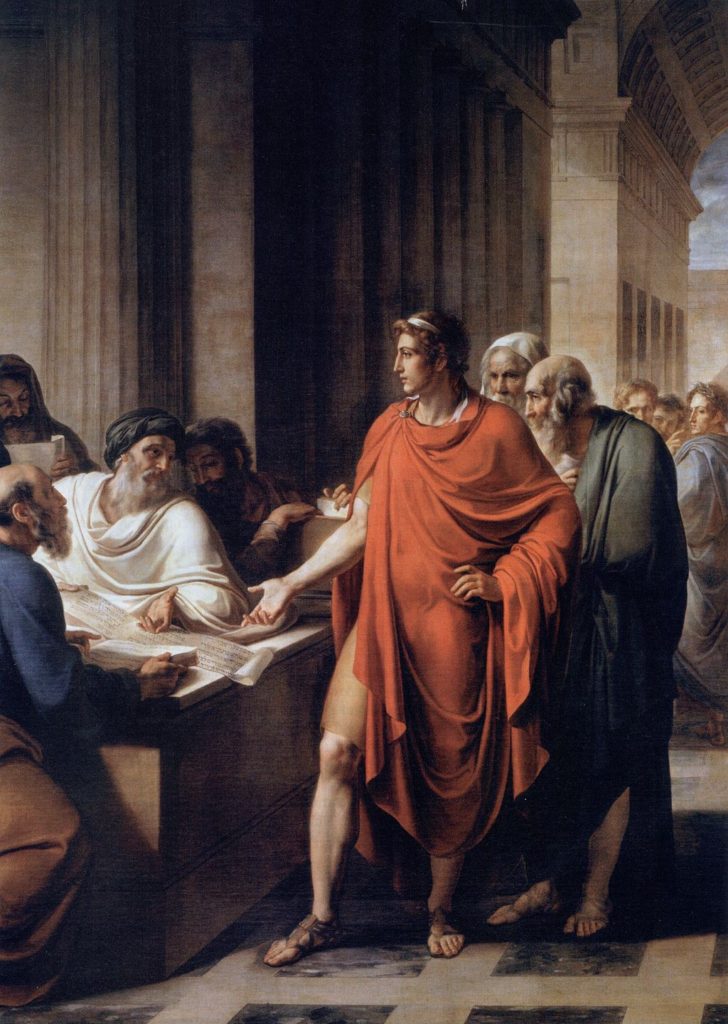
290 BC to 270 BC, Psalm 33: The Septuagint.
This site was first built in French (see www.147thgeneration.net). The English translation was mainly done using « google translation ». We have tried to correct the result of this translation to avoid interpretation errors. However, it is likely that there are unsatisfactory translations, do not hesitate to communicate them to us for correction.
(for that click on this paragraph)
Summary
This generation is from the years 290 BC to 270 BC
According to our count, this generation is the 33rd generation associated with Psalm 33. It is in this Psalm 33 that we therefore find an illustration of the facts of this generation.
To this generation Ptolemy II Philadelphus becomes king of Egypt. Jerusalem which is part of the empire of the Lagides will be in the dependence of this king for two generations. During his reign, the Jews will live one of the quietest periods in their history. The Lagids bring to the world an unprecedented cultural openness that opens the way for modern civilizations
Under Ptolemy I Soter was created the Library of Alexandria. The Ptolemies were eager to fill this library with all possible books, from all cultures. The agents of the Ptolemies traveled all over the Hellenic world to buy books.
It is in this logic of universalism that, naturally, the Lagide power seeks to enrich the library of books of the Jewish people. As he enriched it with the books of all peoples involved in the world opened by Alexander as the Egyptian people or the Indian people. However, only the Greek language can be used, as the only practiced by the masters of the Lagid Empire.It is in this logic of universalism that, naturally, the Lagide power seeks to enrich the library of books of the Jewish people. As he enriched it with the books of all peoples involved in the world opened by Alexander as the Egyptian people or the Indian people. However, only the Greek language can be used, as the only practiced by the masters of the Lagid Empire.
Thus was born the Greek translation of the Jewish Bible or at least at first the first books of the Pentateuch. Due to the number of translators, 70, this version will be called the Septuagint. The Septuagint will be of prime importance for the study of the sacred texts with the Jewish populations in Diaspora who speak only in Greek and who therefore could not study the sacred texts in the original Hebrew version. It will obviously also be an important vector of Monotheism among non-Jewish populations.
Talk
Ptolemy II Philadelphus
To this generation Ptolemy II Philadelphus becomes king of Egypt. Jerusalem which is part of the empire of the Lagides will be in the dependence of this king for two generations, indeed Ptolemy II Philadelphus reigns from 282 BC to 246 BC.
During his reign, the Jews will live one of the quietest periods in their history. The Lagids bring to the world an unprecedented cultural openness that opens the way for modern civilizations:
- The[2] Lagid monarchy, at the end of the reign of Ptolemy I Soter (325 BC – 285 BC), had established in its capital a remarkable organization of scientific research. Royal favor attracted and retained Alexandria, from all parts of the world, not only poets and scholars, but also scientists. The most remarkable each in its category: surveyors, astronomers, doctors, historians, critics and grammarians. Exempt from taxes and charges, fed at the king’s expense, the « Museum boarders » lived in community in the shade of the Palace.
The Library of Alexandria
Next to the Museum, had already been created under Ptolemy I Soter, the library of Alexandria. The Ptolemies were eager to fill this library with all possible books, from all cultures:
- The[3] agents of the Ptolemies traveled all over the Hellenic world to buy books. They used force if necessary. Then, when the demand for Alexandria became known, all the library brokers flocked there to sell their precious volumes. They came mainly from Athens and Rhodes, the great bookstore centers of the time. But probably also from Pergamum, Antioch in Syria, or even Syracuse. […]. In addition to the masterpieces of Greek literature, the Library of Alexandria contained the works of Manetho, on ancient Egypt.

It is in this logic of universalism that, naturally, the Lagide power seeks to enrich the library of books of the Jewish people. As he enriched it with the books of all peoples involved in the world opened by Alexander as the Egyptian people or the Indian people. However, only the Greek language can be used, as the only practiced by the masters of the Lagid Empire.
The Septuagint
The Greek translation of the Jewish Bible is announced in « The Letter of Aristeas » as follows:
- King [1] Ptolemy (II Philadelphe) to High Priest Eleazar, health and safety. Given that a considerable number of Jews live on our territory, expelled from Jerusalem by the Persians at the time of their domination. That he then arrived in Egypt again with my father, as prisoners of war, he places many in the army with high pay. Similarly, as he knew the fidelity of those who were already in the country, he established garrisons and entrusted them with them, to keep the Egyptian people in their care. As for us who succeed him, we make the most friendly advances to all, but especially to your compatriots. We have surrendered to liberty more than a hundred thousand, who were prisoners of war, by paying to their master a just indemnity (this episode is detailed upstream in the letter) pecuniary, applying ourselves to repair all the damages which could have been come from the popular passions, conscious of doing this holy work, with consecration of an offering to the very great God, who has preserved our kingdom in peace with the greatest glory in the whole world. Thus we have placed in the ranks of the army those who are in the prime of life, when to those who had aptitudes even for our personal service and deserved to be entrusted to the Court we put them at the head of some services. Eager to please them, and to all the Jews of the earth and their descendants, we have decided to have your law translated from what you call the Hebrew text into the Greek language, to have these books also in our library, with the other books of the King. Under these conditions, you would do well and you would respond to our concern, by choosing men of exemplary life, Elders versed in the knowledge of their Law, able to make a translation, six from each tribe, to find a text that represents the agreement of the majority, given the importance of research. As well, we believe that once accomplished, this work will do us great honor.
Thus was born the Greek translation of the Jewish Bible or at least at first the first books of the Pentateuch. Due to the number of translators, 70, this version will be called the Septuagint.
The propagation of sacred texts
The Septuagint will be of prime importance for the study of the sacred texts with the Jewish populations in Diaspora who speak only in Greek and who therefore could not study the sacred texts in the original Hebrew version. It will obviously also be an important vector of Monotheism among non-Jewish populations. These two types of population can only be grateful to the efforts of Ptolemy II to obtain this Greek version of the Bible, as expressed by Philo of Alexandria:
- It[4] is from there (the Greek translation of the Bible by the Septuagint) that our annual feast and our general assembly come from the island of Pharos (place where the Septuagint would have made their translation). Where do not only Jews go, but all kinds of other peoples, to celebrate the place where the first translation was created, and, to thank God for an already ancient but always new benefit … As well, for the benefit of the people Jew, the Law, by its influence, will make all the others pale. As the rising sun does with the stars.
This contribution to humanity represented by the translation and dissemination of the Bible in Greek is what the beginning of the Psalm expresses:

- Sing praises to the Lord, O you righteous; for the upright, praise is fitting.
- Give thanks to the Lord with a harp; with a lyre of ten melodies make music to Him.
- Sing to Him a new song; play well with joyful shouting.
- For the word of the Lord is upright, and all his deeds are with faith.
- He loves charity and justice; the earth is full of the Lord’s kindness.
Indeed, this translation would allow the world, Jew and non-Jew, to become acquainted with the history of the creation of the world and thus to apprehend the unicity of the creator of this world, thus opening the door to the universal diffusion of the world. monotheism.
It is this reaffirmation of the story of creation that is repeated in the following psalm:

- By the word of the Lord, the heavens were made, and with the breath of His mouth, all their host.
- He gathers in the water of the sea as a mound; He puts the deeps into treasuries.
- Let all the earth fear the Lord; let all the inhabitants of the world stand in awe of Him.
- For He said and it came about; He commanded and it endured.
The Jewish people subjected to the empire of Lagids, subject to the Greek world, devoid of military power, by the diffusion of the divine word, imposes on the world the values related to Jewish Monotheism throughout the Greek empire.
This new victory over David’s ideas on Goliath (from the small to the large to the military power level) is expressed in the end of the psalm:

- The Lord frustrated the counsel of nations; He put the plans of peoples to nought.
- The counsel of the Lord shall endure forever; the plans of His heart to all generations.
- Praiseworthy is the nation whose God is the Lord, the people that He chose as His inheritance.
- The Lord looked from heaven; He saw all the sons of men.
- From His dwelling place He oversees all the inhabitants of the earth.
- He Who forms their hearts together, Who understands all their deeds
- The king is not saved with a vast army; a mighty man will not be rescued with great strength.
- A horse is a false hope for victory, and with his power, he will not escape.

[1] « The letter from Aristée to Philocrate » following the French translation by André Pelletier (Éditions du Cerf). (French: « La lettre d’Aristée à Philocrate » suivant la traduction d’André Pelletier (Éditions du Cerf). Versets 35 à 39 ).
[2] Preface of: « The letter from Aristée to Philocrate » following the French translation by André Pelletier. (French references: « La lettre d’Aristée à Philocrate » suivant la traduction d’André Pelletier (Éditions du Cerf) ). Chapter IX « The Alexandria Museum »
[3] Preface of: « The letter from Aristée to Philocrate » following the French translation by André Pelletier. (French references: « La lettre d’Aristée à Philocrate » suivant la traduction d’André Pelletier (Éditions du Cerf) ). Chapter X « The Library of Alexandria »
[4] Philo of Alexandria following a quote from André Pelletier in : Preface of: « The Letter from Aristée to Philocrate « . (French references: « La lettre d’Aristée à Philocrate » suivant la traduction d’André Pelletier (Éditions du Cerf) ). Chapter XII.
